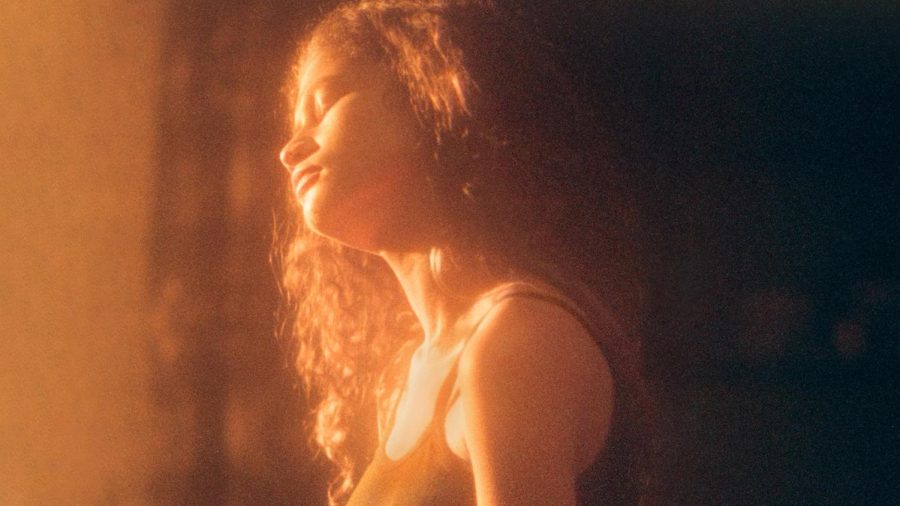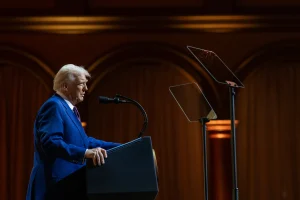The good, the bad and the ugly of ‘Euphoria’
The discourse around “Euphoria” is missing something: professional opinion. Here’s what experts are saying about the trendiest show on TV right now.
March 7, 2022
This article contains spoilers for HBO’s “Euphoria.”
HBO’s “Euphoria” is the trendiest show on television right now. Viewership for the second season is up nearly 100% from Season One, and the diverse, star-studded cast and crew are slated to break even more records in the future.
From the colorful makeup and the age-inappropriate fashion choices to the famous lines and award-winning original music, the discourse surrounding “Euphoria” is missing professional opinion and critique.
“Euphoria” is a well-produced show. Despite this, some critics say that Season Two fell short, from both a visual and narrative standpoint.
“The [Season Two finale] was a dumpster fire of pacing issues and lacked the signature style that makes the show fun to watch in the face of absurdity,” said Mary Siroky, a writer for Consequence TV, in a Season Two review article. “It’s completely impressive that the hour managed to both be overstuffed and completely devoid of any cohesion at the same time.
Alyxandra Vesey, a UA professor who specializes in the gender politics of labor in the music industry, film history and media theory, agreed.
“One of my big misgivings about [‘Euphoria’] is that I think that often the visual aesthetics mask what I would sometimes argue is poor or shallow storytelling at a script level,” Vesey said. “I struggled with A24 and HBO having the sort of psychedelic visual feast, because they’re erasing some of the historical precursors for it to make it feel like it’s new rather than continuing with preexisting story forms, story structures and generic conventions.”
“Euphoria” is produced by A24, the same studio that produced films such as “Ex Machina,” “The Lighthouse” and “Moonlight.”
It’s a studio known for its unique style and storytelling, which Vesey called “transgressive” and “hedonistic” due to several references and homages to New Queer Cinema, an early ’90s film movement with a heightened visual style from the likes of Gregg Araki and Todd Haynes.
Samuel Getachew, a poet, student journalist and writer at Yale University, said in a Vogue article that the visual style of “Euphoria” has impacts more far-reaching than just audience perception. It can begin to influence the social lives of young people.
Getachew said the aestheticization of trauma that is depicted in “Euphoria” does not properly disclaim the risks and hazards that the characters deal with.
“The last thing we needed was a vehicle to further romanticize our self-destructiveness. The last thing we needed was the conglomeration of all of our local sources of social pressure into one glimmery, sexy national emblem for what it meant to be an angsty teen,” he said. “The problem with ‘Euphoria’ isn’t that it is attempting to endorse what it illustrates; the problem with ‘Euphoria’ is that it isn’t attempting to do anything at all.”
Young people’s indulgent reactions to these dangerous situations involving unsafe sex, drug abuse and addiction, and the social pressures that come with it, might partially explain why shows like “Euphoria” are so popular.
“These types of shows offer us a safe environment in which we can anticipate the types of emotions that will be activated when watching; we’re also then more effective in how we respond to and manage these emotions,” licensed psychologist Timothy Schlairet said in an article for Huffington Post.
Schlairet said when young people observe the emotions that they might experience in a world not too different from the one on screen from a safe distance, it can make them feel more comfortable with what life could throw at them.
Psychologist Sabrina Romanoff said in the same article that to some, fictional characters may exist to take the weight off the shoulders of the viewers.
“Watching the fears and worries that originate from the minds of other shows in a viewing commentary that validate those concerns has calming effects. We refer to this process as projective identification,” Romanoff said. “In other words, aspects of the self, like fear and dread, are split off and attributed to an external source.”
Psychologically, it’s easy to find comfort in “Euphoria.” The characters might be easy to compare oneself to, but the high-stakes, dangerous plotlines that they endure can seem distant, bringing on a sense of consolation.
Some viewers may find comfort in the show because of its relatability, but there seems to be a stark division.
“It’s always really interesting whenever I talk about this show with students, because there will be two kinds of camps,” Vesey said. “There’s the camp that’s like, ‘This show was a documentary, this was absolutely what my life was like when I was in high school,’ and then there’s the camp — admittedly, I’m in this camp — ‘What school did you go to? I didn’t see any of this, what are you talking about?’”
Certain storylines in “Euphoria” seem to come directly from its creator’s own experiences with drug abuse and addiction. At the premiere of Season One, Sam Levinson opened up about his addiction.
“Sam Levinson is the son of a very prominent Hollywood director, Barry Levinson,” Vesey said. “He’s a white kid that grew up rich in Los Angeles, and his experiences and his access to drugs and his issues with addiction wouldn’t necessarily be felt the same as a biracial Black girl with a single Black mother living in a nondescript LA suburb.”
Stigma surrounding mental health and drug use can prevent people from seeking help, especially people of color.
In a Pew Charitable Trust article, Scott Nolen, the director of the Addiction and Health Equity Program at the Open Society Institute of Baltimore, said African Americans often face challenges accessing treatment for substance use due to “stigma, bias and socioeconomic status.”
“The legal system, law enforcement, mental health services and those sorts of medical establishments would treat [Levinson’s] addiction very differently from [‘Euphoria’ protagonist Rue’s] addiction in terms of how we understand how white supremacy structures those institutions,” Vesey said.
Vesey theorized that these stigmas are mostly absent from Rue’s life because Levinson is the sole writer of the show.
“It’s not really evident, largely because a rich white man is writing his addiction narrative onto a biracial Black girl. … It just feels a little false,” she said.
While the social implications of Rue’s drug addiction might not be the most accurate, “Euphoria” seems to have gotten one thing right: queer representation.
Several of the characters refuse to be defined by a single label or identity, instead embracing their sexuality. Zendaya’s character, Rue Bennett, has sexual relationships with Jules and romantic interactions with Elliot. Her sexuality is never defined, nor is it an important issue.
Most groundbreaking is Hunter Schafer’s character Jules, who is unapologetically and openly transgender. Her depiction as a young transgender woman is something never shown on primetime television before. In Jules’ special episode, Jules brings the discussion of what it means to be feminine and a woman to the national stage.
“Schafer’s performance was vulnerable and unwavering,” a columnist for NYU Local wrote. “Jules’s conversation with her therapist reveals how loving outside the confines of heteronormativity can cause one to redefine society’s confines for themselves, including the way one expresses gender.”
The conversations that complex and undefined characters like Rue and Jules bring to the table symbolize something big: a shift toward a more accepting and genuine stage for trans representation.
“Jules is a manifestation, and a triumph, of the scaffolding that trans creators have been building for the past few years in Hollywood,” said Zackary Drucker, producer of “Transparent,” another show highlighting trans actors and characters, in an IndieWire article. “We have been lobbying for more complex representations of trans people, and ‘Euphoria’ is both a measure of our progress and a successful outcome deserving of celebration.”
In a short time, “Euphoria” has accomplished what other shows wish they could. With only two seasons, it’s HBO’s second-most watched show, only falling behind the eight seasons of “Game of Thrones.”
With a booming social media presence and enough momentum to be renewed for a third season, “Euphoria” doesn’t look to be going anywhere soon.





















